
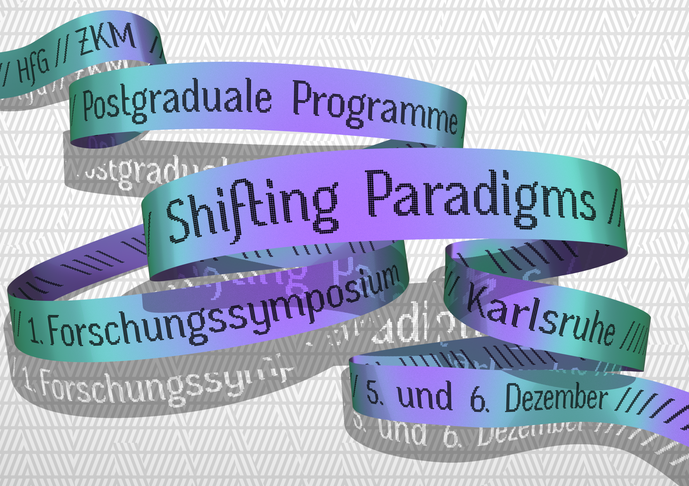
Shifting Paradigms Symposium 2024 - Key Visual, Photo: Sophie Eckhardt, Felix Köder, Michael Rothfuß
The Staatliche Hochschule für Gestaltung (HfG) Karlsruhe and the Center for Art and Media in Karlsruhe (ZKM) were conceived in the 1990s by founding director Heinrich Klotz as places for contemporary research focused on new media. With their combination of university and cultural institution, they offer excellent preconditions for the networking of artistic and scientific approaches, for which, however, a different framework is still needed in Germany.
An overarching postgraduate program is intended to bring together and utilize interdisciplinary expertise in order to explore the relationships between art, theory and design in a new way, thus building on the pioneering founding idea of the HfG and ZKM. At the same time, it is intended to respond to a larger paradigm shift that seems to be taking place in art and culture as well as in the scientific field and which is expressed on the one hand in crises of legitimization and on the other in new and creative forms of research and production of knowledge. The HfG Karlsruhe is taking this diagnosis as an opportunity to redesign hybrid formats of research and also to question the function of academic doctorates.
To present and discuss these programmatic considerations, the HfG is organizing a first symposium with international guests in cooperation with the ZKM Karlsruhe on 5 and 6 December 2024, which aims to design spaces and ideas for a transforming research practice.
In four panels, the French historian and philosopher of science Bernadette Bensaude-Vincent, the professor of art studies and media theory Matthias Bruhn, the professor of time-based media and performance Filipa César, the scenographer and deputy HfG rector Constanze Fischbeck, the ZKM director Alistair Hudson, the artist and professor of code and image Susanne Kriemann, ADBK Munich Professor Armin Linke, ZKM-Hertzlab Director Tina Lorenz, artist, curator and member of the Raqs Media Collective Monica Narula, Professor of Critical Theory and Media Philosophy Simon Sheikh, performance artist and activist Joy Mariama Smith, Professor for Design Füsun Türetken and Professor of Digital Aesthetics Nina Zschocke with other experts, the audience and members of both institutions.
Information on participation and registration
Start on 5.12. from 2.30 pm, on 06.12. from 10 am to 6 pm
The symposium will be in english language.
Participation in the symposium is only possible with prior registration. Places are limited
Therefore, please register for the symposium by Friday, November 15, 2024 via the following email address: shiftingparadigms(at)hfg-karlsruhe.de
Please add the subject Registration Symposium Shifting Paradigms 2024 to your email and registration and write us your
- full first and last name
- If applicable, your function/institution
- E-mail address where we can reach you
Thank you, we look forward to seeing you!
Your HfG Karlsruhe contact persons for the symposium are: Désirée Düdder-Lechner, Simone Heinrich, Ana Volkland
PROGRAMM
Day 1 / Thursday, 5 Dec. Venue: HfG and ZKM
2.00 pm: Registration and Welcome, Conference Space, HfG Lichthof 4
2.30 pm: “Fellow Travellers“ Exhibition Tour with Alistair Hudson, ZKM “Fellow Travellers” Exhibition Space
3.30 pm: Opening of the Symposium with Constanze Fischbeck (HfG Karlsruhe), Alistair Hudson (ZKM Karlsruhe) and guests, “Useum” in ZKM Fellow Travellers Exhibition Space
4.00 – 6.00 pm: Panel 1: Polycrisis
Lecture Performance by Monica Narula (Raqs Media Collective / ETH Zurich); Panel Discussion with Simon Sheikh (HfG Karlsruhe), Monica Narula (ETH Zurich), Alistair Hudson (ZKM Karlsruhe), Nina Zschocke (HfG Karlsruhe), “Useum” in ZKM “Fellow Travellers” Exhibition Space
6.00 – 8.00 pm: Dinner Intervention by Mona Mayer and Marie Faass (Karlsruhe), HfG Lichthöfe
Day 2 / Friday, 6 Dec. Venue: HfG, Lichthof 4
9.30 am: Arrival, Registration, Coffee
10.00 am – 12.00 pm: Panel 2: Research Matters
Lecture by Bernadette Bensaude-Vincent (Prof. em. University of Paris Panthéon-Sorbonne); Research Reports and Panel Discussion with Susanne Kriemann (HfG Karlsruhe), Armin Linke (AdBK Munich), Bernadette Bensaude-Vincent, Tina Lorenz (Hertzlab, ZKM Karlsruhe). Moderation: Nina Zschocke
12.00 – 1.00 pm Lunch break
1.00 – 3.00 pm: Panel 3: Kill the Dr. phil? Text-based practice and (artistic) research
Talk with Matthias Bruhn (HfG Karlsruhe), Füsun Türetken (HfG Karlsruhe) and guests
3.00 – 3.30 pm: Coffee break
3.30 – 5.30 pm: Panel 4: The Art of Research
Performance by Joy Mariama Smith (Amsterdam); Talk with Filipa César (HfG Karlsruhe), Joy Mariama Smith (Amsterdam), Rike Frank (Berlin), Diana McCarty (HfG Karlsruhe)
5.30 – 6.00 pm: Closing Remarks by Constanze Fischbeck and Alistair Hudson
6.00 – 7.30 pm: Get together, Drinks and Snacks
Please note:
Participation in the exhibition tour and dinner is free of charge; for both, an additional and binding pre-booking by e-mail (ed.ehurslrak-gfh(ta)smgidarapgnitfihs) is required.

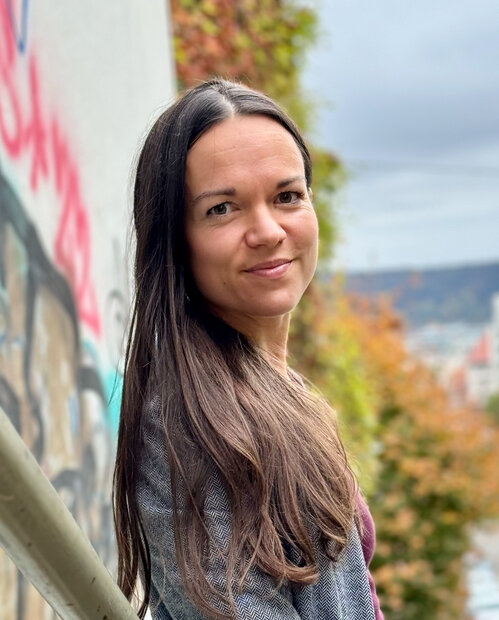
Amrei Bahr (© Amrei Bahr)
Dr. Amrei Bahr is a junior professor for philosophy of technology and information at the University of Stuttgart. Together with Kristin Eichhorn and Sebastian Kubon, she is initiator of the #IchBinHanna campaign, by which they called attention to the precarious working conditions in German academia and sparked an intensive, ongoing public debate on the topic.

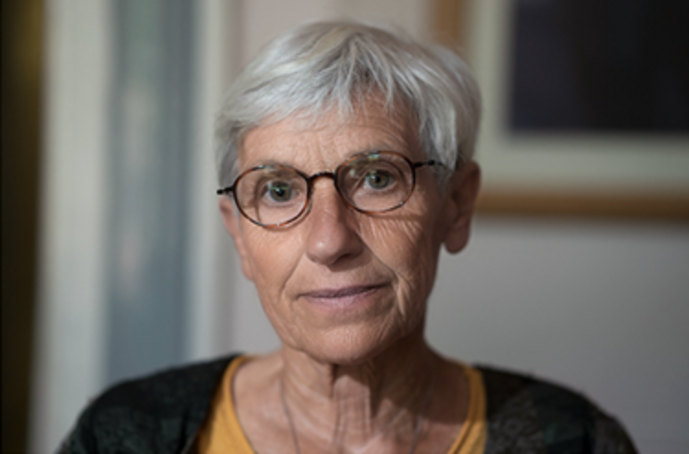
Bernadette Bensaude-Vincent (© Martinez)
Bernadette Bensaude-Vincent, philosopher and historian of science is emeritus professor at Paris I Panthéon-Sorbonne University and a member of the French Academy of Technology. She was the 2021 Sarton Medalist of the History of Science Society and the recipient of the 2024 Franklin Lavoisier medal. Her most recent publications include Temps-paysage. Pour une écologie des crises (2021), Between Nature and Society. Biographies of Materials (2022), Les sciences dans la mêlée co-author G. Dorthe, (2023), Carbon Biography co-author S. Loeve (2024).
Marie Faass lives and works as an artist and graphic designer in Karlsruhe. In her interdisciplinary practice, she combines visual art with performative elements and uses food and everyday materials to create unusual, sensual experiences. She is a graduate of the Karlsruhe University of Arts and Design. Her current work is dedicated to textile and material change. She uses processes such as weaving, layering and the transformation of fabrics to create and scrutinise narratives about change and identity. With her poetic, intuitive approach, Faass invites the audience to experience materiality and narrative in new contexts.

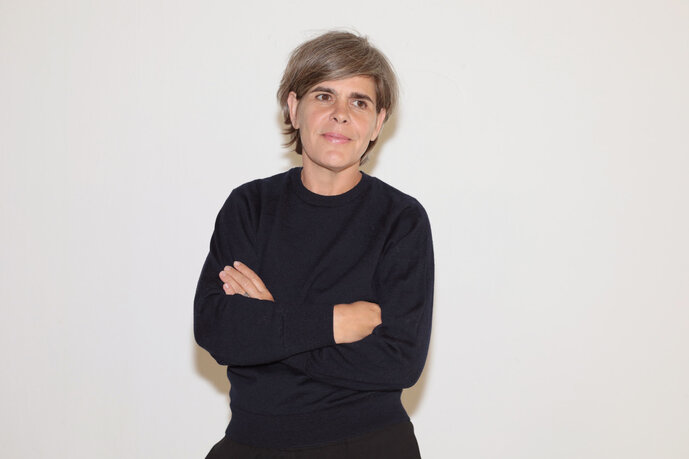
Rike Frank (© Silke Briel)
Rike Frank is Managing Director of the Berlin Artistic Research Programme and, together with Vanessa Joan Müller, Artistic Director of the European Kunsthalle, an institution without its own location. Her curatorial work focuses on temporality, textuality and exhibition history. As (co-)editor she has published Of(f) Our Times. Curatorial Anachronics, Ane Hjort Guttu. Writings, Conversations, Scripts and Textiles: Open Letter. She has a long-standing collaboration with the artist Rosa Barba for the open-air cinema Inside the Outset in Cyprus; her current exhibition Sarah Pierce: Scene of the Myth can be seen at the John Hansard Gallery, Southampton.

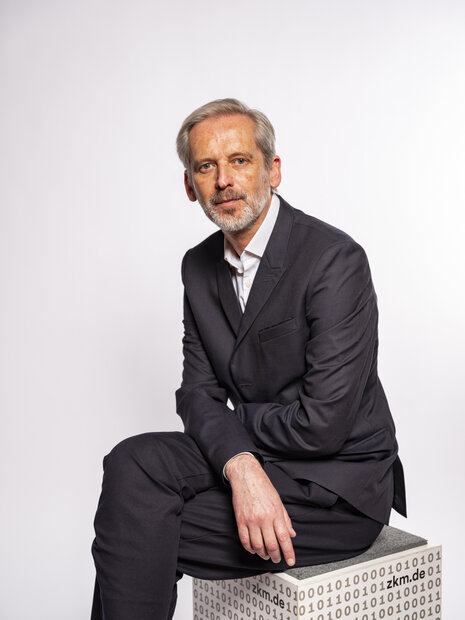
Alistair Hudson (© ZKM Karlsruhe)
Alistair Hudson is the Scientific-Artistic Chairman of the ZKM | Karlsruhe since April 1, 2023. He succeeds Peter Weibel, who had headed the institution since 1999. Hudson is a curator and museum director with broad-ranging international experience. He combines contemporary curatorial expertise with a profound knowledge of the relationship between art, technology and society. From 2018 to 2022 he served as director of two museums in Manchester: the Manchester Art Gallery and The Whitworth. The latter is the art museum of the University of Manchester, where he was also Professor of Useful Art.
Alistair Hudson’s concept of a »useful museum« envisions artistic institutions and cultural institutions as centres of social responsibility and transformation. He believes that they should be run artistically, as works in progress in their own right. Together with the artist Tania Bruguera he heads the Asociación de Arte Útil, a growing international network which collaborates with other institutions such as the Van Abbemuseum in Eindhoven, INSTAR in Havanna and YBCA San Francisco.

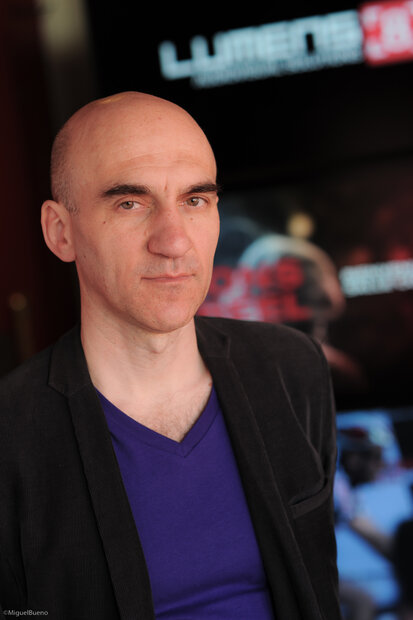
Armin Linke (© Miguel Bueno)
Armin Linke (b. 1966, Milan) is an artist working with photography and film, questioning the medium, its technologies, narrative structures, and complicities within wider socio-political structures. His oeuvre functions as a collection of tools for demystifying different design strategies and languages. In a collective approach with other creatives, researchers and scientists, the narratives of his works expand across multiple discourses, focussing on the questions of installation and display. Linke’s works have been exhibited internationally. Former artist in residence at the KHI Florence and guest artist at the CERN Geneva, he is currently professor at Academy of Fine Arts Munich (AdBK).

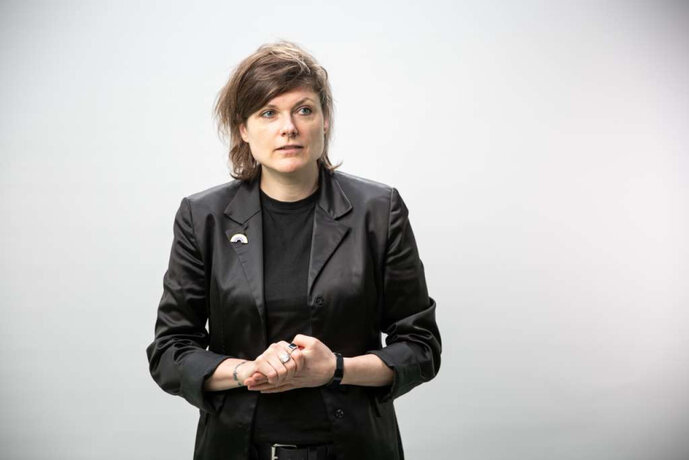
Tina Lorenz (© Andy Koch)
Tina Lorenz came of age in the Chaos Computer Club but went on to study theater studies and American literary history in Vienna and Munich. They were a lecturer for theater history at the Academy for Performing Arts Bavaria, later dramaturge at the Landestheater Oberpfalz and finally consultant for digital communication at the Staatstheater Nürnberg, before founding and leading the Digital Theatre department at the State Theatre of Augsburg from 2020 to 2023. Tina Lorenz is a founding member of the hackspaces metalab Vienna and Binary Kitchen Regensburg; since January 2024, they head the department of artistic research and development »Hertzlab« at ZKM | Karlsruhe.
Mona Mayer was trained as a graphic designer at the HfG Karlsruhe. Her work deals with the disclosure and appropriation of rituals, media, languages and codes as well as their inherent logics, constraints and potentials. She develops her actions, performances, installations and objects in artistic and poetic processes. Mona Mayer lives and works in Karlsruhe.

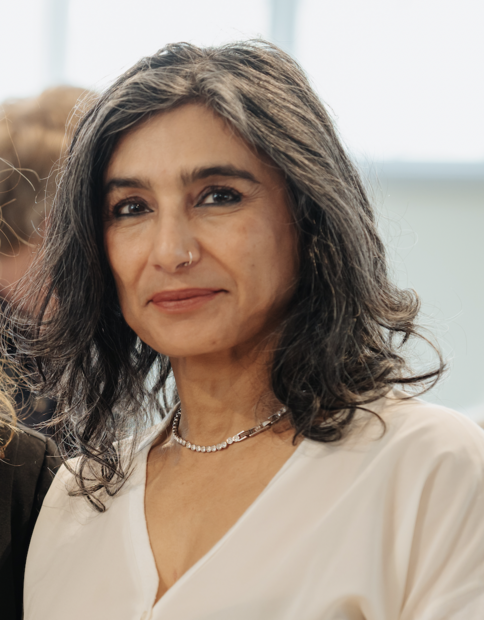
Monica Narula (© Monica Narula)
Monica Narula (IN) is an artist and curator based between Zurich, Paris and New Delhi. Alongside Jeebesh Bagchi and Shuddhabrata Sengupta, Narula is co-founder and member of the Raqs Media Collective. Found in 1992, the collective have curated exhibitions, made films, edited books, staged situations, and collaborated with architects, computer programmers, writers, curators, and theatre directors. Their works have been presented internationally at most major scenarios, from documenta to the Venice Biennale, as well as solo museum exhibitions. Raqs have curated large scale exhibitions such as the Shanghai Biennale, and “In the Open or in Stealth” at MACBA, Barcelona. They co-founded Sarai—the inter-disciplinary and incubatory space at the Centre for the Study of Developing Societies, Delhi—in 2001, where they initiated processes that have left deep impact on contemporary culture in India, and where they also edited the Sarai Reader series (01-09).

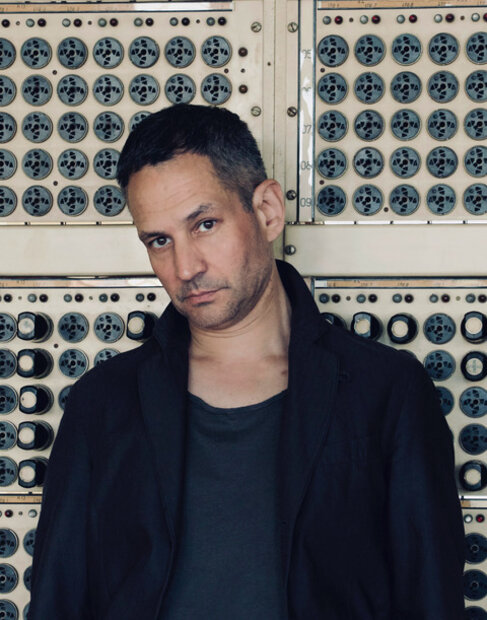
Gerriet K. Sharma (© Gerriet K. Sharma)
Gerriet K. Sharma is a Berlin-based composer, media artist, and artistic researcher in spatial practices. Within the past 20 years he was deeply involved in the spatialisation of electroacoustic and instrumental compositions in Ambisonics and Wave-Field Synthesis. Furthermore, he was extensively concerned with textural transformation processes into 3D-sound sculptures. He studied Media Art at the Academy of Media Arts Cologne (KHM) and composition & computer music at the University of Music and Performing Arts Graz (KUG). In October 2016 he completed his doctorate “Composing with Sculptural Sound Phenomena in Computer Music” at the scientific-artistic doctoral school Graz. From 2009 to 2015 he was curator of “signale-graz” concert series for electroacoustic music, algorithmic composition, radio art, and performance at MUMUTH/KUG. His works were presented at international festivals, conferences and symposia. He received numerous awards and scholarships amongst the German Sound Art Award 2010. From 2022 to 24 he was appointed guest professor at HfG/ZKM Karlsruhe.

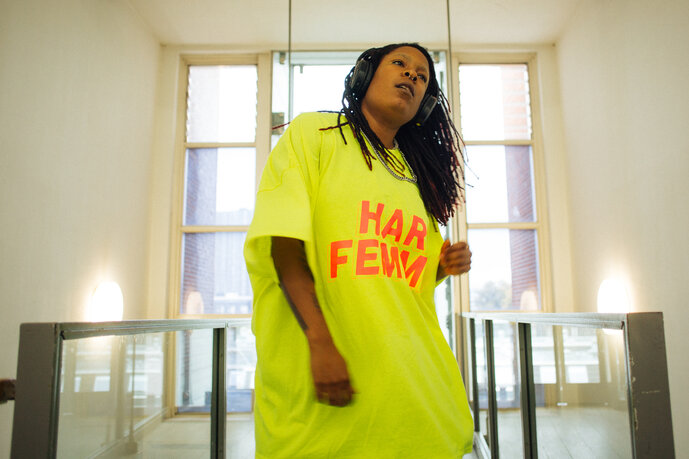
Joy Mariama Smith (© Joy Mariama Smith)
Joy Mariama Smith (US/NL) is an installation and movement artist, activist, educator, and architectural designer. They studied at the Dutch Art Institute in Arnhem; the NewSchool of Architecture & Design in San Diego; L'École Internationale de Théâtre Jacques Lecoq in Paris; and Oberlin College in Ohio. Their work has been performed internationally, including at If I Can’t Dance Edition VI – Event and Duration, Amsterdam; SoLow Festival, Philadelphia; Ponderosa Movement & Discovery in Stolzenhagen, Germany; Freedom of Movement: Municipal Art Acquisitions 2018, Stedelijk Museum, Amsterdam. Currently, they teach at the School for New Dance Development (SNDO) in Amsterdam. They/them/their: third person singular gender-neutral pronoun.
Contributors of HfG
-
-
Prof. Paul Bailey
-
-
Professor for Design in Visual Communication and research (Communication Design)
-
ed.ehurslrak-gfh(ta)yeliabp
-
-
-
Prof. Dr. Matthias Bruhn
-
-
Professor for Art Research and Media Theory
-
T +49 (0) 721 / 8203 2273
ed.ehurslrak-gfh(ta)nhurbm
-
-
-
Prof. Filipa César
-
-
Prof. Filipa César
Professor of Time Based Media & Performance (Media Art) together with Prof. Filipa César.
-
ed.ehurslrak-gfh(ta)rasecf
-
-
-
Prof. Constanze Fischbeck
-
-
Spokesperson for the Exhibition Design and Scenography Section, Professor for Scenography
-
ed.ehurslrak-gfh(ta)kcebhcsifc
-
-
-
Prof. Susanne Kriemann
-
-
Professor for Code & Image (Media Art)
-
ed.ehurslrak-gfh(ta)nnameirks
-
-
-
Prof. Diana McCarty
-
-
Professor of Time Based Media & Performance (Media Art) together with Prof. Filipa César.
Spokesperson for the Media Art department.
(together with Prof. Filipa César)
-
ed.ehurslrak-gfh(ta)ytraccmd
-
-
-
Prof. Dr. Simon Sheikh
-
-
Professor of Theory for Critical Theory and Media Philosophy
Vice-Rector for Studies and Teaching
-
ed.ehurslrak-gfh(ta)hkiehss
-
-
-
Prof. Füsun Türetken
-
-
Department of Design
-
-
-
Prof. Dr. Nina Zschocke
-
-
Professor for Art Studies with a focus on "Digital Aesthetics"
-
ed.ehurslrak-gfh(ta)ekcohcszn
-
Panel 1 (Thursday) Polycrisis
As an introduction to the idea of shifting paradigms, the panel will look at the many crises that we are facing, in academia and beyond, and which requires a critical reflection and revisitation of the modes of inquiry we are using. In the face of this polycrisis (environmental disaster, crumbling infrastructures, socil inequalities, political depression, and the uncertainty of knowledge), we will instead posit concepts of instability, and in her lecture performance Monica Narula will depart from notions of twilight language and cavalcade, followed by responses from Alistair Hudson, Simon Sheikh and Nina Zschocke.
Panel 2 (Thursday) Research Matters
The panel aims to discuss research methodologies in the arts and humanities by presenting multiple approaches to the materiality of media and to matter in its radical existence at the threshold of the visible. Further, the speakers will explore the ways in which contemporary scientific, industrial and social cultures process matter while simultaneously offering broader understandings of materialities, often using ocular instruments, code and laboratories to enhance our sense of the world.
In her lecture, the philosopher of science Bernadette Bensaude-Vincent will comment on her work towards a new philosophy of chemistry. Research reports by artists Susanne Kriemann and Armin Linke as well as by Tina Lorenz, Head of ZKM/ Hertzlab follow.
Panel 3 (Friday) Kill the Dr. phil? Text-based practice and (artistic) research
Does a humanities dissertation have to be 400 pages long? Does a particular design or architectural draft justify a doctorate? And if not, what does this judgement say about the qualification criteria of a written thesis? The panel will discuss the question of the extent to which the academic doctorate can benefit from comparison with other PhD models (especially artistic and practice-based PhD models) and thus sharpen its own profile.
Panel 4 (Friday): The Art of Research
Artistic research, in relation to social and environmental changes, can challenge Western ontoepistemological perspectives. Which paradigm shifts can contribute to an artistic research practice to respond to demands for planetary justice? What kind of research environment can ZKM and HfG offer, as institutions for media art and design, to attend to these transformations and host artistic laboratory processes and resulting discourses?
Dinner Intervention (Thursday)
As part of the ‘Shifting Paradigms’ symposium at the HfG Karlsruhe, artists and designers Marie Faass and Mona Mayer are presenting a joint intervention. In it, the sharing of theoretical discourses is expanded to include a dimension that can be experienced through the senses. The two artists utilise the act of eating and the moment of shared experience and sharing as a performative medium.
To what extent does a possible paradigm shift involve interrelationships between intellectual comprehension and physical-sensual learning? The invitation to participate and interact opens up the space for a collective, poetic and somatic experience for all symposium participants.

